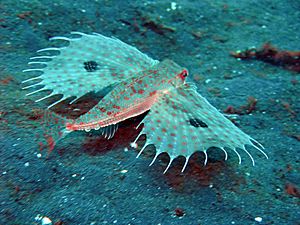Oriental flying gurnard facts for kids
Quick facts for kids Oriental flying gurnard |
|
|---|---|
 |
|
| Conservation status | |
| Scientific classification | |
| Synonyms | |
|
The Oriental flying gurnard (also called the purple flying gurnard) is a cool marine fish. It belongs to a family of fish called Dactylopteridae. Its name "gurnard" comes from a French word. It means "to grunt," because this fish can actually make grunting sounds!
Contents
What Does It Look Like?
The Oriental flying gurnard can grow up to about 40 centimeters (16 inches) long. However, it is usually around 20 centimeters (8 inches). It has a wide head with a rounded snout. Its eyes are set far apart on its head.
This fish has a strong body covered in tough armor. Its top fin has seven spines and nine soft rays. The fin underneath its body has no spines and six or seven soft rays.
Its Amazing Fins
The most amazing part of this fish is its huge, rounded pectoral fins. These fins look like wings! They have many dark spots and wavy lines. The edges of these fins are a bright blue color. Each ray on the fin has a small, feeler-like tip.
The Oriental flying gurnard is very good at hiding. It has a grayish-brown body color. It also has dark brown or black patterns on its head and body. This helps it blend in with its surroundings.
Where Does It Live?
The Oriental flying gurnard lives in warm, tropical waters. You can find it all over the Indo-Pacific region. This includes places like the Red Sea. Its home stretches from the coasts of East Africa to Polynesia. It also lives along the western, northern, and eastern coasts of Australia.
This fish prefers to live on the seabed. It likes bays, estuaries, and sandy areas. You will most often find it at depths of about 10 meters (33 feet). But sometimes, it can be found as deep as 100 meters (330 feet).
How Does It Behave?
Normally, the Oriental flying gurnard keeps its large pectoral fins folded against its body. But if it feels scared or threatened, it quickly spreads out these fins. This sudden display can surprise and scare away animals that might want to eat it. These predators can include fish like sea breams and mackerel.
Walking on the Seafloor
The flying gurnard has a unique way of moving. It uses its pelvic fins to "walk" along the bottom of the ocean. It slowly moves across the sand, looking for food.
What Does It Eat?
The Oriental flying gurnard is a hunter. It eats small bony fish. It also enjoys eating bivalves, which are shellfish like clams. Another favorite food is crustaceans, such as crabs and shrimp.
Gallery






